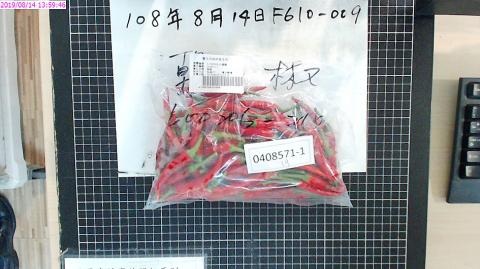Last month’s inspection of fresh fruit and vegetables sold in Taipei found that 21.6 percent of the tested items had pesticide residue exceeding the maximum residue limits (MRLs), the Taipei Department of Health said yesterday.
A total of 88 samples were collected in August, and test found that 19 of them had pesticide levels higher than the MRLs — a failure rate of 21.6 percent, it said.
The items that failed the tests include Gynura bicolor, often called Okinawan spinach, which had four types of pesticide residue, and a shallot with three types of pesticide residue.

Photo courtesy of the Taipei Department of Health
A longan, a chili pepper, edible amaranth and Gynura bicolor were found with two types of pesticides, while 13 items had residue from one pesticide exceeding the MRLs, including two samples of coriander and muskmelons, and one sample of longan, passionfruit, Taiwanese lettuce, pea, Fushan lettuce, Gynura bicolor, okra, string bean and lemon.
Nine of the failed items were collected from the Taipei Agricultural Products Marketing Corp (TAPMC) and were sold at Taipei First Wholesale Fruit and Vegetable Market, including a bag of chili peppers that had residue of the fungicide hexaconazole up to 26 times the MRL and another fungicide, pyraclostrobin, up to three times the MRL.
The sources of the failing fruit and vegetables could face fines of between NT$60,000 and NT$200 million (US$1,933 and US$6.44 million), and if the stores cannot identify the source, they would face fines from NT$30,000 to NT$3 million, the department said.
The TAPMC has also been informed that the suppliers of the problematic items must stop supplying fresh fruit and vegetables for 10 days, and they could lose their supplier license if their products failed tests for a second time, it said.

The US government has signed defense cooperation agreements with Japan and the Philippines to boost the deterrence capabilities of countries in the first island chain, a report by the National Security Bureau (NSB) showed. The main countries on the first island chain include the two nations and Taiwan. The bureau is to present the report at a meeting of the legislature’s Foreign Affairs and National Defense Committee tomorrow. The US military has deployed Typhon missile systems to Japan’s Yamaguchi Prefecture and Zambales province in the Philippines during their joint military exercises. It has also installed NMESIS anti-ship systems in Japan’s Okinawa

TRAGEDY STRIKES TAIPEI: The suspect died after falling off a building after he threw smoke grenades into Taipei Main Station and went on a killing spree in Zhongshan A 27-year-old suspect allegedly threw smoke grenades in Taipei Main Station and then proceeded to Zhongshan MRT Station in a random killing spree that resulted in the death of the suspect and two other civilians, and seven injured, including one in critical condition, as of press time last night. The suspect, identified as a man surnamed Chang Wen (張文), allegedly began the attack at Taipei Main Station, the Taipei Fire Department said, adding that it received a report at 5:24pm that smoke grenades had been thrown in the station. One man in his 50s was rushed to hospital after a cardiac arrest

‘WIN-WIN’: The Philippines, and central and eastern European countries are important potential drone cooperation partners, Minister of Foreign Affairs Lin Chia-lung said Minister of Foreign Affairs Lin Chia-lung (林佳龍) in an interview published yesterday confirmed that there are joint ventures between Taiwan and Poland in the drone industry. Lin made the remark in an exclusive interview with the Chinese-language Liberty Times (the Taipei Times’ sister paper). The government-backed Taiwan Excellence Drone International Business Opportunities Alliance and the Polish Chamber of Unmanned Systems on Wednesday last week signed a memorandum of understanding in Poland to develop a “non-China” supply chain for drones and work together on key technologies. Asked if Taiwan prioritized Poland among central and eastern European countries in drone collaboration, Lin

ON ALERT: Taiwan’s partners would issue warnings if China attempted to use Interpol to target Taiwanese, and the global body has mechanisms to prevent it, an official said China has stationed two to four people specializing in Taiwan affairs at its embassies in several democratic countries to monitor and harass Taiwanese, actions that the host nations would not tolerate, National Security Bureau (NSB) Director-General Tsai Ming-yen (蔡明彥) said yesterday. Tsai made the comments at a meeting of the legislature’s Foreign Affairs and National Defense Committee, which asked him and Minister of National Defense Wellington Koo (顧立雄) to report on potential conflicts in the Taiwan Strait and military preparedness. Democratic Progressive Party (DPP) Legislator Michelle Lin (林楚茵) expressed concern that Beijing has posted personnel from China’s Taiwan Affairs Office to its